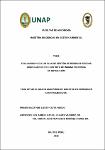| dc.contributor.advisor | Chávez Vásquez, Rafael | |
| dc.contributor.advisor | Ramírez Chung, José Francisco | |
| dc.contributor.author | Zuta Pinedo, Lizbeth | |
| dc.date.accessioned | 2023-02-10T16:07:54Z | |
| dc.date.available | 2023-02-10T16:07:54Z | |
| dc.date.issued | 2022 | |
| dc.identifier.uri | https://hdl.handle.net/20.500.12737/8805 | |
| dc.description.abstract | The present work was developed in the District of Indiana, county Maynas; department Loreto whose coordinates are 3º30`02 `` S 73º03`28 ``, the objective was to carry out the evaluation of the domiciliary solid residuals generated in the District the investigation it was of quantitative and type, the design was not experimental, prospective and traverse, the population was conformed by all the housings that you/they pay their municipal wills and the sample was of 53 housings, being ended up concluding: of the participants in the work the (66%) they manifest that there are not containers of garbage, the (68%) they separate their garbages, the residuals more reutilizables are the plastic bottles (49%), the (83%) he/she receives the service of public cleaning and he/she doesn't also know the final destination of the garbage, the (100%) he/she pays municipal wills and he/she would want to participate of a segregation program with the municipality, all the (100%) they manifest that a wrong handling of solid residuals causes illnesses in the population, the illness more related to this wrong handling they are the breathing ones (41,5%) you present especially in old men and children, The GPC for inhabitant per day is of (0.89Kg/hab./día) having a projection of (4.45 T/día), (133.5 T/mes) and ( 1,624.25 T/anual), the biggest quantity in residuals not generated dangerous they are (94,14%) being the most representative in the sample the organic residuals (78,31%), therefore the hypothesis is accepted outlined in the investigation work. | en_US |
| dc.description.abstract | El presente trabajo se desarrolló en el Distrito de Indiana, provincia Maynas; departamento Loreto cuyas coordenadas son 3º30`02`` S 73º03`28``, el objetivo fue realizar la evaluación de los residuos sólidos domiciliarios generados en el Distrito, la investigación fue de tipo cuantitativa de nivel descriptivo, el diseño fue no experimental, prospectiva y transversal, la población de estudio estuvo conformada por los propietarios de cada vivienda que pagan sus arbitrios municipales y la muestra fue de 53 viviendas, llegándose a concluir: de los participantes en el trabajo el (66%) manifiestan que no hay contenedores de basura, el (68%) separan sus basuras, los residuos más reutilizables son las botellas plásticas (49%), el (83%) recibe el servicio de limpieza pública y también no sabe el destino final de la basura, el (100%) paga arbitrios municipales y desearía participar de un programa de segregación con la municipalidad, todos el (100%) manifiestan que un mal manejo de residuos sólidos causan enfermedades en la población, la enfermedad más relacionada a este mal manejo son las respiratorias (41,5%) presentes especialmente en ancianos y niños, La GPC por habitante por día es de (0.89 Kg/hab./día) teniendo una proyección de (4.45 T/día), (133.5 T/mes) y (1,624.25 T/ anuales), la mayor cantidad de residuos generados no peligrosos son (94,14%) siendo los más representativos de la muestra los residuos orgánicos (78,31%), por lo tanto se acepta la hipótesis planteada en el trabajo de investigación. | es_PE |
| dc.format | application/pdf | es_PE |
| dc.language.iso | spa | es_PE |
| dc.publisher | Universidad Nacional de la Amazonía Peruana | es_PE |
| dc.rights | info:eu-repo/semantics/openAccess | * |
| dc.rights.uri | https://creativecommons.org/licenses/by/4.0/ | * |
| dc.subject | Administración de residuos | es_PE |
| dc.subject | Residuos domésticos | es_PE |
| dc.subject | Plan de acción | es_PE |
| dc.subject | Evaluación del impacto ambiental | es_PE |
| dc.subject | Zonas rurales | es_PE |
| dc.title | Evaluación hacia un plan de gestión de residuos sólidos domiciliarios en el distrito de Indiana provincia de Maynas 2019 | es_PE |
| dc.type | info:eu-repo/semantics/masterThesis | es_PE |
| thesis.degree.discipline | Maestría en Ciencias en Gestión Ambiental | es_PE |
| thesis.degree.grantor | Universidad Nacional de la Amazonía Peruana. Escuela de Postgrado | es_PE |
| thesis.degree.name | Maestro(a) en Ciencias en Gestión Ambiental | es_PE |
| dc.subject.ocde | https://purl.org/pe-repo/ocde/ford#5.06.02 | es_PE |
| dc.subject.ocde | https://purl.org/pe-repo/ocde/ford#2.07.01 | es_PE |
| renati.author.dni | 43607805 | |
| renati.advisor.orcid | https://orcid.org/0000-0002-6517-1826 | |
| renati.advisor.orcid | https://orcid.org/0000-0002-9952-1169 | |
| renati.advisor.dni | 05273584 | |
| renati.advisor.dni | 05286297 | |
| renati.type | https://purl.org/pe-repo/renati/type#tesis | es_PE |
| renati.discipline | 521227 | es_PE |
| renati.level | https://purl.org/pe-repo/renati/level#maestro | es_PE |
| renati.juror | Campos Baca, Luis Exequiel | |
| renati.juror | Tello Fernández, Ronald | |
| renati.juror | Delgado Vásquez, Octavio | |
| dc.publisher.country | PE | es_PE |





